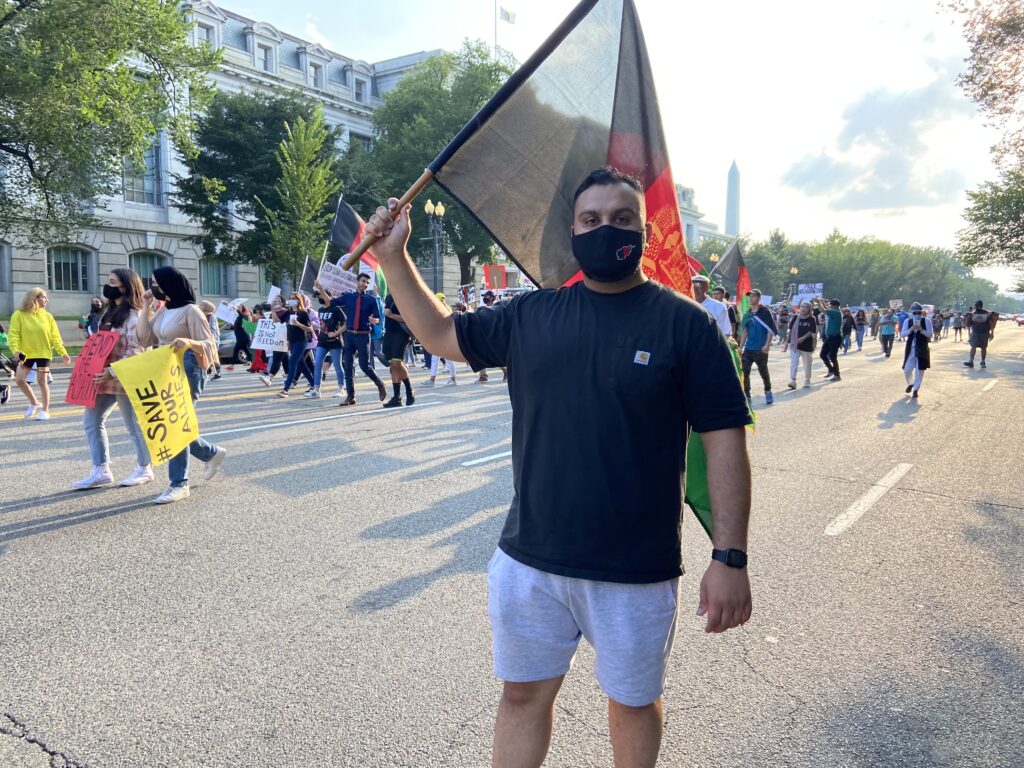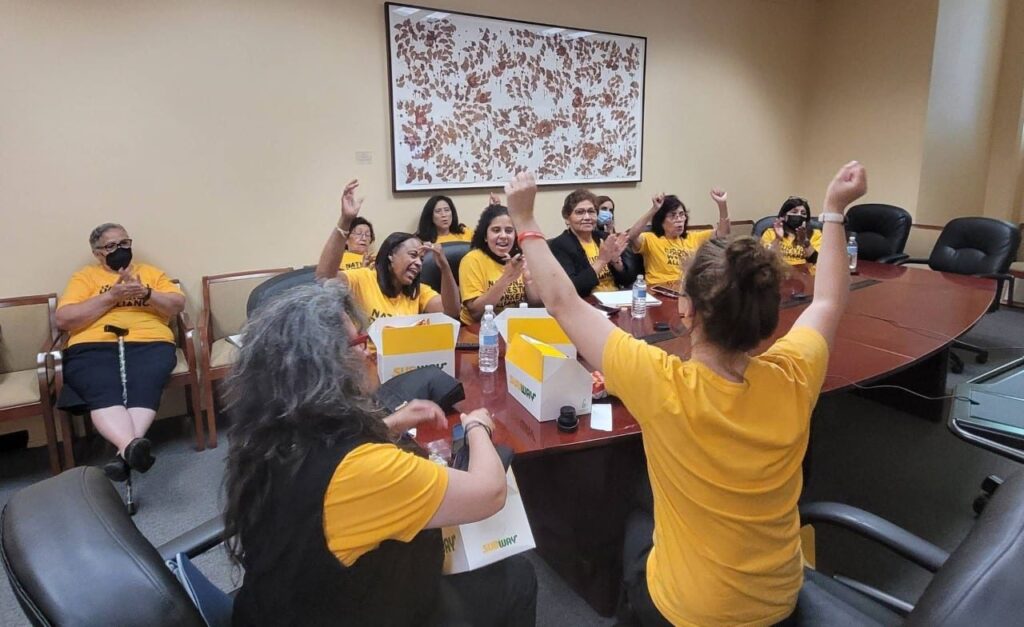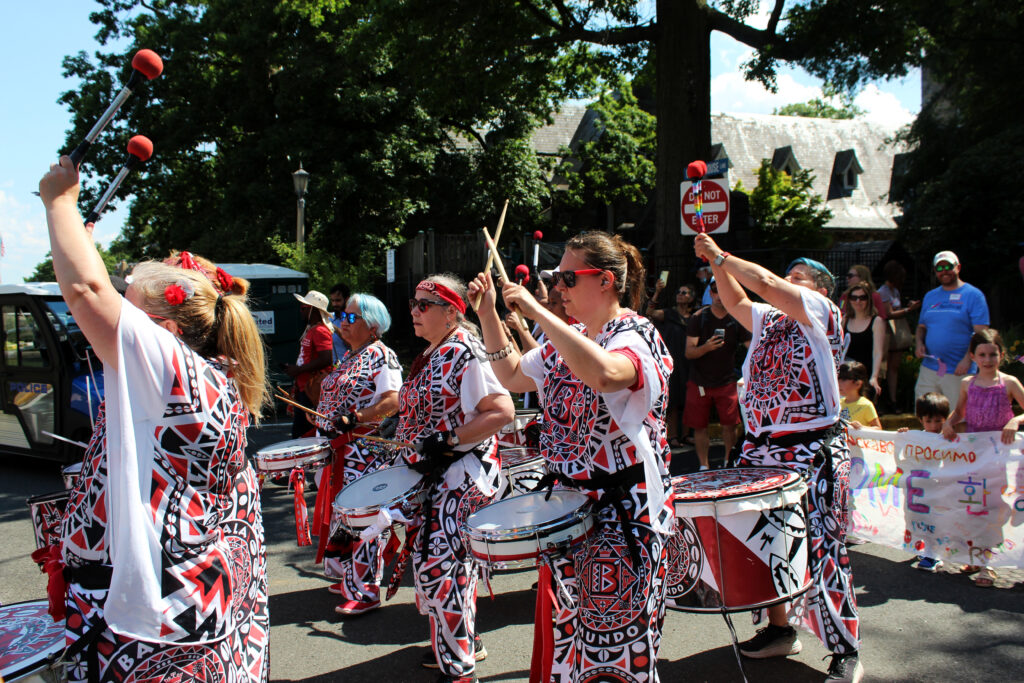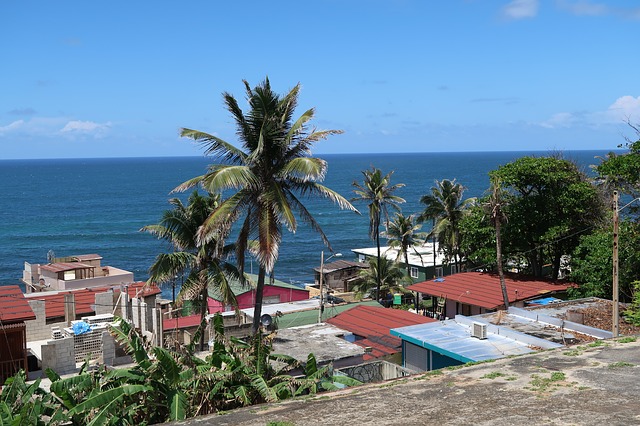The article below has been made available in both English and Dari, a Persian dialect that is the most widely spoken language in Afghanistan. Translation courtesy of Abdul Hakeem Amir, Rohullah Alijani, Ainuddin Anwari, and Sarah Watson.
[su_tabs]
[su_tab title=”English” anchor=”English” target=”self”]
Three days before the U.S. completed its withdrawal from Afghanistan, brother and sister Sulton and Iman Naieem passed around index cards to protesters gathering in Lafayette Square. The cards contained a list of basic demands: evacuate at-risk Afghans, increase U.S. quotas for refugees, and provide humanitarian aid to those left behind. Printed on the opposite side of the cards were slogans such as “free, free Afghanistan!” and “Black, red, and green, we hear your screams!” that helped guide protesters in their chants throughout the day.
The Aug. 28 protest and subsequent march to the Capitol were personal for the Naieems and many others who attended. With the withdrawal not yet finalized at the time, some were hoping that the government would extend its deadline for evacuations.
Some protesters came to the U.S. as refugees in the ‘80s and ‘90s. Others, such as the Naieems, had parents who came during the same period. Veterans were also among the crowd. All were united in the effort to make sure the Biden administration and the broader American public heard the voices of those left behind.
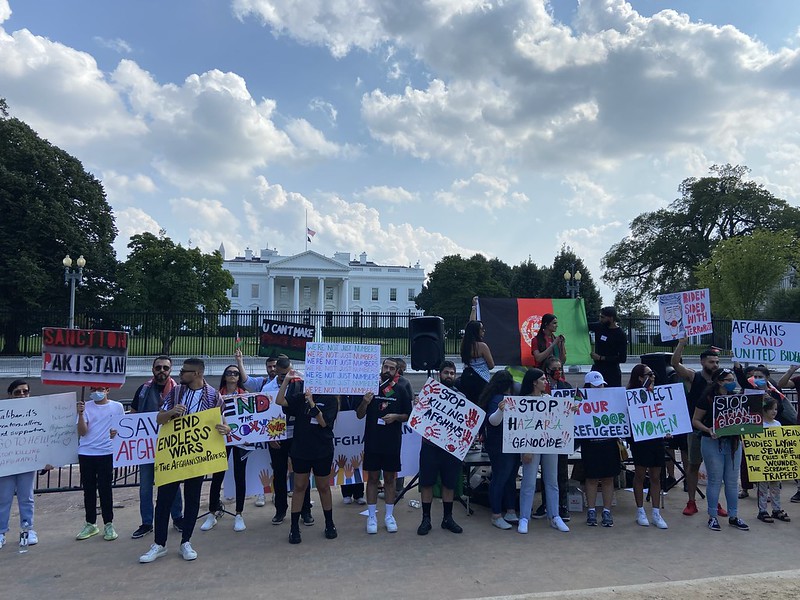
“I have a lot of cousins still there, and their families, and friends. They’re all trying to get out,” said Tahmina Achekzai, one of the dozen volunteers helping to direct demonstrators at the park. Achekzai was just one among dozens of young Afghan Americans who recounted to Street Sense Media and The DC Line stories about loved ones whose lives were now at risk because of the withdrawal.
On the outer edge of the gathering, Nina Aziz, a first-generation Afghan American whose father came to the U.S. in the ‘90s, described how people she knew were being affected by the recent Taliban takeover.
“I know a couple of family friends whose 3-year-old was kidnapped by the Taliban,” Aziz said.
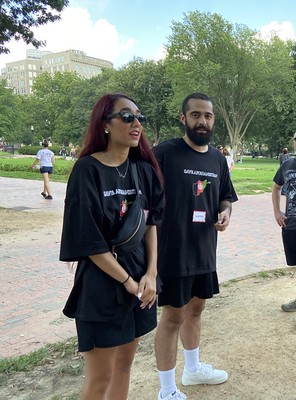
With thousands of Afghan refugees expected to arrive in the U.S. in the coming months, she hopes to see broad pressure on Congress and the White House to accept more refugees and expand protections for them. How many refugees the U.S. will accept is set every year before the next fiscal year starts on Oct. 1. After resettling 2,700 Afghan refugees in FY 2016, the U.S. only resettled 494 refugees in the first nine months of FY 2021, according to the Center for Public Integrity. While the overall limit was 15,000 in 2021, the federal government now expects to resettle more than 50,000 evacuees — including many who are not classified as refugees and lack a Special Immigrant Visa — from Afghanistan, according to data obtained by CBS News. With the numbers having dropped in recent years, Aziz said she hopes people will stay focused on the issue, even after the withdrawal fades from the headlines.
Getting out of Afghanistan is just the first of many challenges that refugees who manage to make it into the U.S. must overcome. Obstacles can include learning a new language, adapting to a new culture, finding a suitable job, and affording a home. Within the Washington region, housing can be the hardest of these hurdles because of the soaring cost of rent.
Refugees and Special Immigrant Visas: How it all works
Due to the high cost of housing, the State Department generally does not resettle refugees within the District of Columbia. The average cost of a two-bedroom apartment is $3,427, according to Apartment List. While the Washington region is home to a sizable group of Afghan Americans, the State Department recently announced it would focus on resettling refugees from Afghanistan in other areas throughout the country, including Baltimore, Philadelphia and Atlanta.
When selecting a resettlement area, officials consider factors such as cost of housing, prospects of employment, and availability of cultural and community resources for newcomers. The State Department also considers a person’s connection to an area when placing them in a specific locale. Other factors in play include state policies.
The State Department has identified 19 “welcoming” communities where Afghans and Iraqis could settle based on a number of measures, including but not limited to housing availability.
It goes without saying, New York City didn’t make the cut. pic.twitter.com/CUkOUdvkXh
— Aaron Carr (@aaronAcarr) August 31, 2021
In Virginia, for instance, refugees must have a personal family connection to someone already living in the state to initially resettle within its borders, according to Dana Lea, a board member of the local refugee nonprofit Kama D.C. She said Maryland does not have the same restriction, instead accepting refugees regardless of their connection to the state.
Even with this difference in policy, many refugees from Afghanistan have resettled in Virginia. Recently, three military bases in the state have welcomed thousands of Afghans and their families.
Many of the refugees coming into the U.S. have a Special Immigrant Visa (SIV) offered through a program signed into law in 2006. The visa grants Afghan and Iraqi translators who worked with the U.S. military a legal way to immigrate to the United States. The government later expanded SIV eligibility to include Afghans and Iraqis employed in their host country and engaged in activities that supported NATO efforts.
But as Lea — who has been involved in refugee resettlement for seven years — pointed out, SIV holders do not necessarily come into the U.S. the same way other refugees do. With visas in hand, they do not always rely on the U.S. government to schedule their travel out of their home country.
“Because they received these visas, they can purchase their flight and just come to the U.S.,” said Lea.
Before the recent Taliban takeover of Afghanistan, many Afghan SIV holders came into the U.S. by paying for seats on commercial flights.

At least 8,000 SIV applicants have entered the U.S. in the past month, according to Military Times. As of January 2021, however, there was a backlog of more than 17,000 applications.
Even though their process for entering the U.S. looks different, SIV-holders have access to the same kinds of assistance given to all refugees. Considering the high cost of resettling in a new area, however, the amount of support doesn’t stretch too far. The State Department offers one-time payments of $1,200 per person, which many local nonprofits pointed out is insufficient for paying rent in the Washington area. The payment is the same regardless of where a refugee family settles.
The Office of Refugee Resettlement within the U.S. Department of Health and Human Services contracts with nine agencies across the country to help distribute the funds. These nonprofit agencies also help provide refugees with furnishings for their homes and case-management support. While the D.C. Department of Human Services does not engage in resettlement per se, it does provide refugee assistance for D.C. residents, helping to connect them with social benefits including access to medical care and the local Temporary Assistance for Needy Families (TANF) cash payment program. Under TANF, an individual can receive up to $414 per month in flat payments for eight months.
[Read more: DC innovator hosts refugees and domestic violence victims for free]
Resettlement agencies operating in the Washington area such as Catholic Charities, International Rescue Committee, and the Ethiopian Community Development Council also help families with tasks such as applying for Social Security cards, enrolling their children in school, and opening bank accounts.
The one-time cash payment and the initial support services are meant to carry refugees through their first three months in the country. However, in Lea’s view, this timeline is unrealistic.
“The idea of self-sufficiency itself is constantly discussed [at resettlement agencies],” Lea said. “[But] are you really self-sufficient after three months in a country? No.”
The pain of leaving behind one’s birth country
Hekmatullah Latifi left Afghanistan in February 2016 with his wife, two sons, and two daughters after working for years with the U.S. Agency for International Development and the U.S. Embassy in Kabul. They first settled down in Alexandria before moving to Arlington.
Latifi had never wanted to leave his home country but felt that he could no longer stay given the threats to his family. The danger resulted from Latifi’s job promoting U.S. support for development projects, which included frequent trips to often remote areas of Afghanistan to meet with community leaders and village elders.
Even as Latifi knew the work was dangerous, he believed it was the right thing to do.
“I said, well, it’s my country [and] people from 12,000 miles [away] came … here and they want to help my people. I should be part of this,” Latifi said.
But as time passed, the threats Latifi received were directed not only at him but also his wife and children. The change complicated his choice as to whether to stay in the country he had so loved and wanted to help.
“I was ready to be there and face all the consequences, but I couldn’t accept those challenges and consequences for my children,” Latifi said.

If he decided to stay, Latifi knew it would be a matter of time before the Taliban would go after his family. With the support of his employer, Latifi knew that he had to leave Afghanistan to protect his family.
When Latifi arrived in the United States, he experienced many culturally shocking things, which he sees as natural for anyone moving to a new place. He said he remembered thinking how much more reserved and closed off Americans were when compared to people in his hometown — for instance, in terms of how they spoke about political issues or other sensitive subjects. But Latifi said he and his family soon adjusted.
“You know, kids are like birds. Within two months, they were like fluent [in English],” Latifi said, explaining how quickly his children, who range in age from 9 to 18, adapted to the American way of life.
In his view, the biggest challenge for refugees and other immigrants is securing stable housing.
“Especially for those new arrivals, you know, housing could change the course of their lives. It can give them the confidence and motivation to not worry about their futures,” he said.
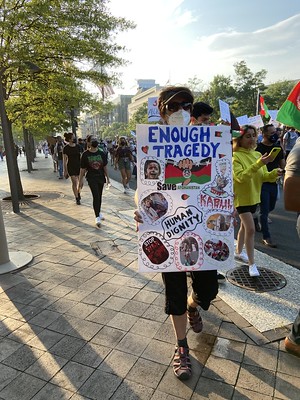
Latifi, who paired with Catholic Charities during the resettlement process, remembers thinking how amazing it would be to work for the organization that was helping his family. But Latifi, who has a master’s degree, said finding suitable employment initially was a challenge. It can take time, he said, to get all the proper certifications and licenses set up in order to start working, depending on one’s profession.
Today, he works for Catholic Charities as a cultural liaison and senior employment specialist — the job he’d initially wanted when first coming to the country.
Jessica Estrada, the director of newcomer services for Catholic Charities of the Diocese of Arlington, said recent arrivals throughout the years have faced the challenges Latifi raised concerning finding suitable housing and employment. Her agency has been involved in refugee resettlement since 1975.
For instance, Estrada said, some landlords can be reluctant to rent to someone who has no credit or employment history in the U.S. Part of her job is convincing property owners to rent to qualified tenants despite these concerns.
Picking up where resettlement agencies fall short
Merritt Groeschel, the executive director and founder of a local nonprofit dedicated to supporting refugees, was on the phone in 2015 when an idea flashed through her mind. It was the height of the Syrian refugee crisis. Groeschel’s mother-in-law, who lived in a small town in Germany that had recently welcomed an influx of refugees, said she was going to invite some of the families over for tea in her garden.
So much of refugee resettlement revolved around what Groeschel’s mother-in-law considered to be mundane, impersonal activities such as searching for a job, applying for government documents, or opening a bank account. But tea in a garden — now this was something that was “normal.” Life, Groeschel and her mother-in-law agreed, is meant to be built and centered around “normal,” not the businesslike processes involved with settling down in a foreign country.
“It [must] be so nice to have a normal connection that is not transactional,” Groeschel remembers thinking. “And I thought, ‘You know, I live in Washington, D.C. There must be [Syrian refugees] here too. I just have never seen them before,’” Groeschel said.
After calling everyone she could think of, Groeschel learned of an opportunity to sponsor a Syrian family. They stayed in Groeschel’s home for a few weeks and connected her with other Syrian refugees and volunteers.
Before long, she and other volunteers began to identify shortfalls with the care refugee families were receiving from resettlement agencies. Many of the women they were helping, for instance, could not leave home to attend English classes because of a lack of access to child care.
“And they were becoming more and more isolated,” Groeschel explained.

With many of the women whom Groeschel had encountered craving social interaction, Groeschel teamed up with other volunteers to start hosting English classes in community spaces that were within easy walking or driving distance of the participants’ homes.
“When we first had our first class in one of the library branches, a group of women were driven there by one of the husbands, and they called us on a cellphone from the parking lot and asked if they were permitted to enter into the library,” Groeschel said.
According to Groeschel, the Syrian refugees didn’t know the library was open to the public.
By 2017, Groeschel’s loose-knit support morphed into a new organization called Solutions in Hometown Connections that helps pick up where refugee resettlement agencies might fall short in assisting new refugees in finding community.
The Syrian refugee crisis inspired several other locals to start nonprofits with similarly aligned goals. One of Street Sense Media’s founders, Laura Thompson Osuri, started Homes Not Borders in 2017, just as the crisis was at its crescendo.
[Read more: Volunteers help refugees find schools, find jobs and make friends]
“We wanted to address the career-job aspect,” Thompson Osuri said, citing the need for mentorship and employment support for refugees looking to establish themselves in industries they are interested in.
Among the group’s offerings is a carpentry workshop at its location in Landover, Maryland, for people who aspire to make furniture. Lately, however, Thompson Osuri said the group’s space has been overrun with items being donated for Afghan refugees. Its volunteers have been busy coordinating the donations and doing home setups for people being resettled in the area. Once the immediate tasks ease, she said, they hope to shift their attention to growing an artisan empowerment program.
Today, multiple local organizations — including Catholic Charities, the Ethiopian Community Development Council, the International Rescue Committee, and the Lutheran Immigration Refugee Service, among others — have put out calls for volunteers to do everything from serving as a translator or mentor, to helping collect and sort donations.
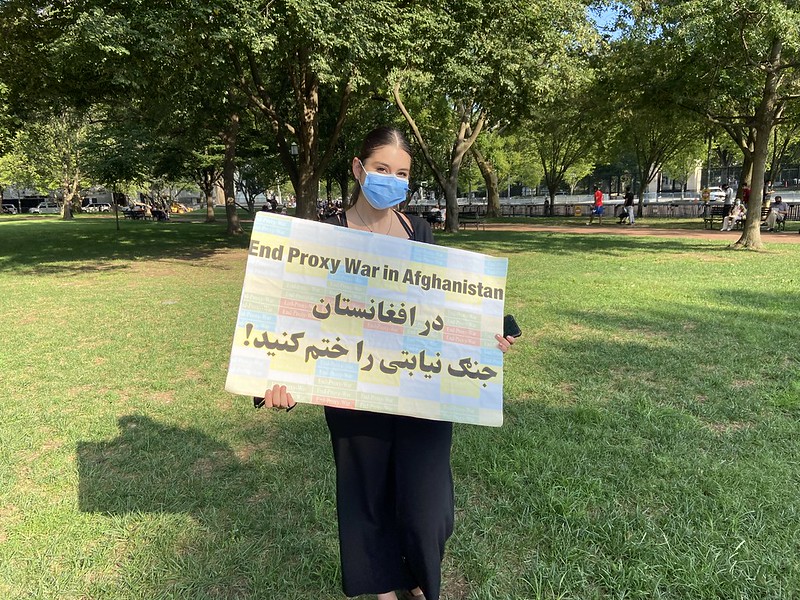
Concern about fleeting public focus
In 1982, as the Soviets were laying siege to Afghanistan, a 17-year-old Afghan boy named Habib Marzi stepped off a plane in New York City. In the four decades since then, Marzi has never forgotten the pain of the experience. Fleeing from a war that had taken the life of his older brother, Marzi could feel his heart tearing as he walked into his new life.
“It’s not just something you can, 41 years later, you know,” he said, overcome by the powerful memories. “I still feel the sorrows and the pain.”
Soon after arriving in the United States, Marzi settled down in Falls Church, where he finished high school. He remembers the help he received from one of his teachers, who recognized his interest in fixing cars. The teacher went out of his way to help foster Marzi’s auto-repair hobby. Today, he runs his own auto shop on Minnesota Avenue NE in D.C.
Marzi said he achieved everything he set out to do when he came to the U.S. But getting there required two years of work to finally get a decent handle on English — on top of the challenges of acclimating to a new country and culture. And these travails paled in comparison to what he still considers the most difficult challenge of all.
“The hardest part is to leave your home country, your birth country, your relatives, friends, everything that you’ve known for almost 17 years — and then, all of a sudden, in the blink of an eye, it’s gone,” Marzi said.
March heading down 15th st pic.twitter.com/iYB2lxVZ04
— Will Schick (@schick_will) August 28, 2021
On Aug. 28, Marzi stood amid the crowds assembled in front of the White House and marched alongside hundreds of others toward the Capitol, demanding that his adopted country not forget those it left behind in his homeland, which has plunged back into an all-out brutal war. Marzi vowed never to forget those in Afghanistan and to do what he can to help.
Whether the U.S. as a whole will maintain a similar focus is a major concern for Estrada, Groeschel, Thompson Osuri, and others interviewed for this article. While several local nonprofits have seen a surge of support and donations in recent weeks stemming from the heavy focus on the U.S. withdrawal, organizers hope people will remain committed to helping refugees far into the future.
“SIVs are like the hot topic at the moment, so we want to keep people interested because this is not a problem that’s going to be solved in a month,” Thompson Osuri said.
[/su_tab]
[su_tab title=”دری (Dari)” anchor=”Dari” target=”self”]
ایالات متحده پناهجویان را در منطقه واشنگتن دی سی مستقر نمیکند زیرا باش گران است.
سه روز قبل از خروج ایالات متحده از افغانستان، یک خواهر و برادر (سلطان و ایمان نعیم) کارت های شاخص را به معترضانی که در میدان لافایت تجمع کرده بودند، ارسال کردند. این کارت ها شامل فهرستی از خواسته های اساسی چون تخلیه افغان های در معرض خطر، افزایش سهمیه های ایالات متحده برای پناهجویان و ارائه کمک های بشردوستانه به بازماندگان بود. در طرف دیگر این کارت های شعار های افغانستان آزاد، آزاد!، سیاه، سرخ و سبز ما فریاد شما را میشنویم! چاپ شده بود که در طول روز برای راهنمایی معترضان کمک مینمود.
در پی اعتراضات ۲۸ آگوست و راهپیمایی های بعدی به سمت کنگره برای نعیم و بسیاری دیگر که شرکت کرده بودند، با توجه به اینکه زمان خروج آمریکا از افغانستان نهایی نشده بود، برخی ها امیدوار بودند که دولت ایالات متحده زمان تخلیه را تمدید کند.
برخی از معترضان در دهه های ۸۰ و ۹۰ به عنوان پناهنده به آمریکا آمده بودند. دیگران نیز مانند خانواده نعیم که در همان زمان مهاجر شده بودند. سربازان اسبق نیز در میان جمعیت بودند. همه در تلاش بودند تا مطمئن شوند که دولت باید و عموم مردم آمریکا صدای بازماندگان در افغانستان را شنیده اند.
برخی از معترضان در دهه های ۸۰ و ۹۰ به عنوان پناهنده به آمریکا آمدند. دیگران ، مانند ناییمز ، والدینی داشتند که در همان دوران آمده بودند. جانبازان نیز در میان جمعیت بودند. همه در تلاش بودند تا مطمئن شوند که دولت بایدن و عموم مردم آمریکا صدای بازماندگان را شنیده اند.
تهمینه اچکزی میگوید؛ من هنوز هم اقارب و دوستان زیادی در آنجا دارم که همه در تلاش بیرون شدن از آنجا هستند. اچکزی یکی از ده ها داوطلب میباشد که برای راهنمایی تظاهرکننده گان کمک میکند. وی داستان های استریت سنز مدیا و دی سی. لاین را در مورد عزیزانی که به دلیل خروج آمریکا، آنها در حال حاضر در معرض خطر قرار دارند، بازگو میکند.
در حاشیه این گردهمایی، نینا عزیز، نسل اول آمریکایی افغان تبار که پدرش در دهه 90 به امریکا مهاجر شده بود، میگوید که وی میداند که افرادی که تحت تسلط اخیر طالبان اند چگونه تحت تاثیر قرار گرفته اند.
نینا میگوید؛ من چندین دوست های خانوادگی ام را میشناسم که طفل سه ساله آنه توسط طالبان اختطاف شده است.
با توجه به اینکه هزاران مهاجر افغان در ماه های آینده وارد ایالات متحده میشوند، وی امیدوار است تا شاهد فشار های گسترده ای بر کنگره و کاخ سفید برای پذیرش پناهجویان بیشتر و گسترش حمایت از آنها باشد. تعداد پناهجویان ایالات متحده هر سال قبل از شروع سال مالی بعدی در اول اکتبر تعیین میگردد. پس از مستقر شدن ۲۷ پناهجو افغان در سال مالی ۲۰۱۶، ایالات متحده فقط ۴۹۴ پناهجو را در ۹ ماه اول سال مالی ۲۰۲۱ مستقر کرد.
بر اساس داده های CBS NEWS در حالی که محدودیت کلی در سال ۲۰۲۱ حدود ۱۵۰۰۰ پناهجو بود، دولت فدرال اکنون انتظار دارد بیش از ۵۰۰۰۰ تخلیه شده گان از افغانستان تخمین شده است، از جمله بسیاری از افرادی که به عنوان پناهنده طبقه بندی نشده و فاقد ویزای مهاجرتی خاص میباشند در اینجا مستقر میشوند. با کاهش تعداد در سالهای اخیر، عزیز اظهار امیدواری کرد که مردم حتی پس از محو شدن خروج روی این موضوع متمرکز بمانند.
بیرون شدن از افغانستان تنها اولین چالشی است که پناهجویانی که موفق به ورود به ایالات متحده میشوند باید آن فائق آیند. موانع دیگری میتواند شامل یادگیری لسان جدید، سازگاری با فرهنگ جدید، یافتن شغل مناسب و تأمین خانه باشد. در منطقه ایالت واشنگتن، مسکن متواند سخترین این موانع باشد زیرا هزینه اجاره آن بسیار زیاد است. .
ویزای خاص پناهندگی و مهاجرت: اما به چه شکل می باشد.
به دلیل هزینه بالای مسکن، وزارت خارجه به طور کلی پناهندگان را در منطقه کلمبیا اسکان نمی دهد. مصارف متوسط یک آپارتمان دو خوابه مطابق لیست نرخ اٰپارتمان به مقدار ۳۴۲۷ دلار می باشد. در حالی که در واشنگتن مسکن گروه قابل توجهی از افغان های آمریکایی است ، وزارت امور خارجه
اخیراً اعلام کرد که بر اسکان مجدد پناهجویان از افغانستان در مناطق دیگر در سراسر کشور ، از جمله
بالتیمور ، فیلادلفیا و آتلانتا تمرکز خواهد کرد.
هنگام انتخاب منطقه اسکان مجدد ، مقامات عواملی مانند مصارف مسکن ، چشم انداز اشتغال و در دسترس بودن منابع فرهنگی و اجتماعی برای تازه واردان را در نظر می گیرند. وزارت امور خارجه همچنین ارتباط افراد با منطقه ای را هنگام قرار دادن آنها در یک منطقه خاص در نظر می گیرد. سایر عوامل در این زمینه شامل سیاست های دولت است.
به عنوان مثال ، در ویرجینیا ، پناهندگان باید دارای ارتباط خانوادگی شخصی با فردی باشند که قبلاً در این ایالت زندگی می کرده است.
دانا لیا ، یکی از اعضای هیئت مدیره پناهندگان غیرانتفاعی: او گفت که مریلند محدودیت مشابهی ندارد در عوض پذیرش پناهندگان بدون در نظر گرفتن ارتباط آنها با دولت میباشد . حتی با وجود این تفاوت در سیاست ، بسیاری از پناهندگان از افغانستان در ویرجینیا اسکان یافته اند. اخیراً سه پایگاه نظامی در این ایالت پذیرای هزاران افغان و خانواده های آنها بوده است.
بسیاری از پناهندگانی که به ایالات متحده می آیند دارای ویزای مهاجرتی خاص هستند که از طریق برنامه ای که در سال ۲۰۰۶ امضا شده است ، ارائه این برنامه شده اند. این ویزا به مترجمان افغان و عراقی که با ارتش ایالات متحده کار می کردند یک راه قانونی برای مهاجرت به ایالات متحده می دهد. بعداً دولت صلاحیت را برای افغانها و عراقی هایی که در کشور میزبان خود کار می کردند و در فعالیتهایی که از تلاشهای ناتو حمایت می کرد ، مشغول کرده و گسترش داد. اما همانطور که لیا – که هفت سال است در اسکان پناهندگان مشارکت دارد – اشاره کرد ، دارندگان ویزای خاص (SIV) لزوماً مانند سایر پناهندگان به ایالات متحده نمی آیند. با در دست داشتن ویزا ، آنها همیشه به دولت ایالات متحده تکیه نمی کنند تا سفر خود را به خارج از کشورشان برنامه ریزی کند. لیا می گوید: “به دلیل دریافت این ویزا ، می توانند تکت پرواز خود را خریداری کرده و فقط به ایالات متحده بیایند.” قبل از تصرف اخیر افغانستان توسط طالبان ، بسیاری از دارندگان ویزای خاص (SIV) افغان با پرداخت و مصرف شخصی در پروازهای تجاری به ایالات متحده آمدند. به گفته خبرگذاری میلتری تایمز (Military Times) ، حداقل ۲۰۰۸ متقاضی ویزای خاص (SIV) در ماه گذشته وارد ایالات متحده شده اند. با این حال ، تا جنوری ۲۰۲۱ ، تعداد بیش از ۱۷۰۰۰ متقاضی وجود داشت.
اگرچه روند ورود آنها به ایالات متحده متفاوت به نظر می رسد ، اما دارندگان ویزای خاص (SIV) به انواع کمک هایی که به همه پناهندگان داده می شود دسترسی دارند. با توجه به مصارف بالای اسکان مجدد در منطقه جدید ، میزان حمایت زیاد نیست. وزارت امور خارجه پرداخت های یکبار ۱۲۰۰ دلار برای هر نفر را ارائه میدهد ، که بسیاری از سازمان های غیرانتفاعی محلی برای پرداخت اجاره بها در منطقه واشنگتن کافی نیستند. پرداخت بدون توجه به محل اقامت خانواده پناهنده یکسان است. دفتر اسکان مجدد پناهندگان در وزارت صحت و خدمات انسانی ایالات متحده با ۹ آژانس در سراسر کشور برای کمک به توزیع وجوه قرارداد می بندد. این آژانس های غیرانتفاعی همچنین به اسباب و اثاثیه منزل برای پناهندگان و پشتیبانی مدیریت پرونده کمک می کند. در حالی که دیپارتمنت خدمات انسانی به خودی خود در اسکان مجدد مشارکت ندارد ، به پناهندگان برای ساکن آن کمک می کند و به آنها در ارتباط با مزایای اجتماعی از جمله دسترسی به مراقبت های صحی و برنامه پرداخت نقدی محلی کمک های موقت برای خانواده های نیازمند کمک می کند. برنامه کمک های موقت برای خانواده های نیازمند ؛ یک فرد می تواند تا ۴۱۴ دالر در ماه به صورت پرداخت ثابت به مدت هشت ماه دریافت کند.
آژانس های اسکان مجدد در منطقه واشنگتن مانند موسسات خیریه کاتولیک ، کمیته نجات بین المللی و شورای توسعه جامعه اتیوپی نیز در انجام وظایفی مانند درخواست کارت های تامین اجتماعی ، ثبت نام فرزندان خود در مدرسه و افتتاح حساب های بانکی به خانواده ها کمک می کنند. پرداخت یکباره نقدی و خدمات پشتیبانی اولیه به این معنی است که پناهندگان را در سه ماه اول اقامت خود در کشور حمایه می کنند. با این حال ، از نظر لیا ، این جدول زمانی غیر واقعی است. لیا می گوید: “ایده خودکفایی دائما در آژانس های اسکان مجدد مورد بحث قرار می گیرد.” “اما آیا واقعاً پس از سه ماه اقامت در یک کشور خودکفا هستید؟ خیر. ”
درد ترک وطن کشور که در ان تولد شده یی
حکمت الله لطیفی در ماه فبروری ۲۰۱۶ همراه با همسر ، دو پسر و دو دختر خود پس از سالها کار کردن در اداره توسعه بین المللی ایالات متحده و سفارت آمریکا در کابل ، افغانستان را ترک کرد. آنها ابتدا در الیسیندیرا ساکن شدند و سپس به آرلینگتون رفتند
لطیفی هرگز نخواسته بود کشور خود را ترک کند اما احساس می کرد با توجه به تهدیدهای خانواده اش دیگر نمی تواند بماند. این خطر ناشی از شغل لطیفی در حمایت از ایالات متحده برای پروژه های توسعه بود ، که شامل سفرهای مکرر به مناطق اغلب دور افتاده افغانستان برای ملاقات با رهبران جامعه و بزرگان روستا بود
حتی با توجه به اینکه لطیفی می دانست کار خطرناک است او معتقد بود که کار درستی است
“من گفتم خوب این کشور من است [و] افرادی از ۱۲۰۰۰ مایل دورتر آمدند …و اینجا آنها می خواهند به مردم من کمک کنند. من باید بخشی از این موضوع باشم ”لطیفی گفت
اما با گذشت زمان تهدیدهایی که لطیفی دریافت کرد نه تنها به او بلکه به همسر و فرزندانش نیز توجه داشت. این تغییر انتخاب او را در مورد ماندن در کشوری که او آنقدر دوست داشت و می خواست به او کمک کند پیچیده کرد
لطیفی گفت: “من آماده بودم تا آنجا باشم و با تمام عواقب آن روبرو شوم ، اما نمی توانم آن چالش ها و پیامدهای فرزندانم را بپذیرم
لطیفی اگر تصمیم به ماندن می گرفت ، می دانست که طالبان به دنبال خانواده اش می روند. لطیفی با حمایت رئیس کار خود می دانست که برای محافظت از خانواده اش باید افغانستان را ترک کند
وقتی لطیفی وارد ایالات متحده شد ، بسیاری از چیزهای تکان دهنده فرهنگی را تجربه کرد ، که برای هر کسی که به مکان جدیدی نقل مکان می کند طبیعی است. او گفت که به یاد می آورد که آمریکایی ها در مقایسه با مردم شهر خود چقدر محتاط تر و بسته تر بودند – به عنوان مثال ، در مورد نحوه صحبت آنها در مورد مسائل سیاسی یا سایر موضوعات حساس. اما لطیفی گفت که او و خانواده اش به زودی سازگار شدند یا عادت کردن
“می دانید بچه ها مانند پرندگان هستند. در مدت دو ماه آنها به زبان انگلیسی مسلط شدن. ”لطیفی در توضیح گفت اینکه چگونه فرزندانش که از ۹ تا ۱۸ سال سن دارند با شیوه زندگی آمریکایی سازگار شدند
به نظر وی ، بزرگترین چالش برای پناهندگان و دیگر مهاجران ، تأمین مسکن پایدار است
او گفت که به خصوص برای کسانی که تازه وارد شده اند ، مسکن می تواند مسیر زندگی آنها را تغییر دهد. و این می تواند به آنها اعتماد به نفس و انگیزه بدهد که نگران آینده خود نباشن
لطیفی ، با موسسات خیریه کاتولیک یکجا شد همکاری می کرد و به یاد می آورد که فکر می کند کار در سازمانی که به خانواده اش کمک می کرد چقدر شگفت انگیز خواهد بود. اما لطیفی که دارای مدرک کارشناسی ارشد است، گفت که یافتن شغل مناسب در ابتدا یک چالش بود. به گفته وی گرفتن همه تقدیر نامه ها و مجوزهای مناسب برای شروع کار زمان بر است و بستگی به مسلک شخص دارد
امروز او در موسسات خیریه کاتولیک به عنوان یک رابط فرهنگی و متخصص اشتغال کار می کند – شغلی که او ابتدا برای اولین بار به این کشور می خواست
مسئولیت پذیری هنگامیکه که مراکز اسکان مجدد کوتاهی میکنن
مریت گروشل، مدیر اجرایی و بنیانگذار یک موسسه غیر انتفاعی محلی که به حمایت از پناهجویان مختص شده است، در سال ۲۰۱۵ در حال صحبت کردن در تلفون بود که مفکوره در ذهنش خطور کرد که آن اوج بحران آوارگان سوریه یی بود. مادر شوهر گروشل که در یک قریه کوچک در آلمان زندگی میکرد و آخیراً از هجوم پناهجویان استقبال کرده بود، اظهار داشت که او قصد دارد بعضی ازین خانواده ها را در باغچه خویش برای نوشیدن چای دعوت کند.
مستقر سازی تعداد زیاد از پناهجویان، آنچه مادر شوهر گروشل آنرا کارهای پیش پا افتاده و غیر شخصی میپنداشت میچرد، مانند اشتغالزایی، درخواست اسناد دولتی یا افتتاح حساب بانکی. اما چای در باغچه حالا این یک چیزی عادی بود. گروشل و مادر شوهرش متعقدند که زندگی باید بر بگونه عادی ساخته شوند نه فرآیند های تجاری که مستقر در یک کشور خارجی باشد.
گروشل بخاطر می آورد: ” داشتن یک ارتباط معمولی که قابل معامله نیست باید بسیار خوب باشد.”، “و من فکر کردم،” میدانید، من در منطقه واشنگتن دی سی زندگی میکنم، باید جمع از پناهجویان سوریه یی نیز اینجا باشند. گروشل گفت من تا هنوز آنها را ندیده ام.
گروشل پس از تماس با هرشخصی که فکرش را میکرد، از فرصتی برای حمایت از یک خانواده سوری مطلع شد، که آنها مدت چند هفته در خانه گروشل اقامت داشتن و او را با دیگر پناهجویان و داوطلبان سوری قیام کردند.
دیری نگذشته بود که او و سایر داوطلبان شروع به شناسایی کمبودهای کردند که خانواده های پناهجو از سازمان های اسکان مجدد دریافت میکردند. به گونه مثال، بسیاری از خانم های که به آنها کمک میکردند، به دلیل عدم دسترسی به مراقبت از کودکان شان نمیتانستند از خانه بیرون شوند تا در صنوف درسی زبان انگلیسی شرکت کنند.
گروشل اضافه کرد: آنها بیشتر از همیش در حالت منزوی قرار میگیرند.
گروشل با بسیاری از زنانی که وی با اشتیاق اجتماعی روبرو شده بودند، تیمی را با همکاری دیگر داوطلبان، که میزبانی صنوف لسان انگلیسی بود، را در فضاهای اجتماعی که در فاصله نزدیک از خانه شرکت کنندگان قرار داشتند ، آغاز کردند.
گروشل اضافه کرد: وقتی برای اولین بار صنف اولی مان را در یکی از شاخه های کتابخانه دایر کردیم، گروه از خانم ها توسط شوهر یکی از آنها به آنجا رسیدند، از پارکینگ آنجا با ما به تماس شدند و پرسیدند که آیا آنها اجازه داخل شدن به کتابخانه را دارند؟
قرار گفته های گروشل پناهجویان سوری حتی این را نمیدانستند که کتابخانه برای عامه باز میباشد.
در سال ۲۰۱۷ میلادی حمایت گروشل تبدیل به یک سازمان جدید بنام Solutions in Hometown Connections شد که این سازمان در جایی کمک رسانی مینماید که موسسات اسکان مجدد پناهندگی در کمک به پناهجویان جدید در یافتن اجتماع کوتاهی میکند.
بحران پناهجوی سوری الهام بخش بسیاری از افراد محلی دیگر بود که با اهداف مشابه به فعالیت های غیر انتفاعی خویش بپردازند. یکی از موسسین استریت سنز مدیا Street Sense Media لورا تامپسون اوسوری، در سال ۲۰۱۷ میلادی برنامه تحت عنوان Homes Not Borders یا ( خانه ها مرز ندارند) درست زمانیکه بحران در اوج خود بود، را راه اندازی نمود.
تامپ سن اوسوری با اشاره به نیازمندی راهنمایی و حمایت از اشتغال زایی برای پناهجویان که قصد دارند در صنایع مورد علاقه خویش شامل شوند اظهار داشت که ما میخواستیم به جنبه شغلی بپردازیم.
از جمله پیشنهادات گروه، یک کارگاه نجاری در محل آن در شهر لندور در ایالت مریلند، برای افرادی که آرزوی ساختن مبلات و فرنیچر را دارند، میباشد. با این حال، تامپ سن اوسوری گفت که اخیراً ساحه کاری این گروپ با اجناس که برای مهاجرین افغان اهدا شده است اشغال گردیده است. داوطلبان آن مشغول هماهنگی کمک ها و انجام تنظیمات خانه برای افرادی هستند که در منطقه اسکان داده میشوند. وی افزود، هنگامی که موضوع فوری حل گردد، آنها امیدوارند توجه خویش را به رشد برنامه توانمندسازی صنعتگران معطوف کنند.
امروزه چندین سازمان محلی از جمله موسسات خیریه کاتولیک یا (Catholic Charities)، شورای توسعه جامعه اتیوپی(Ethiopian Community Development Council) ، کمیته نجات بین المللی(International Rescue Committee)، خدمات مهاجرت پناهجویی لوتر (Lutheran Immigration Refugee Service)و غیره سازمانها دیگر از داوطلبان خواسته اند تا از خدمات مترجمی و مشورتی گرفته تا کمک ها، جمع آوری ومرتب سازی کمک ها، همه کار ها را انجام دهند.
نگرانی از توجه زودگذر مردم
در سال 1982، هنگامی که قشون شوروی افغانستان را در محاصره قرار داده بود، پسر 17 ساله بنام حبیب مرزی در شهر نیویورک از هواپیما پیاده شد. چهار دهه بدینسو، مرزی تا هنوز نتوانسته درد آن تجربه را به فراموشی بسپارد. مرزی از جنگی که جان برادر بزرگترش را گرفته بود فرار کرد، احساس میکرد وقتی وارد زندگی تازه یی شد قلبش پاره پاره میگردد.
مرزی میگوید این تنها چیزی نیست که میتوانید، ۴۱ سال بعد، هنوز هم با وجود غلبه بر خاطرات سخت من آن درد ها و غم ها را احساس میکنم.
بلافاصله پس از ورود به ایالات متحده، مرزی در کلیسا فالز مستقر شد، در آنجا دوره مکتب را به پایان رسانید. وی هنوز کمک های یکی از اساتیدش را به خاطر دارد که وی ترمیم موتر آموخت. استادش از راه خود کنار رفت تا مرزی را یاری رساند که در ترمیم موتر ها را به پیش گیرد. امروز وی مالک یک فروشگاه اتومبیل در منطقه واشنگتن دی سی در جاده مینی سوتا NE میباشد.
وی اضافه کرد زمانی که در ایالات متحده آمدم دست به کار شدم و همه چیز را حاصل کردم، اما رسیدن به آنجا دو سالی کاری را دربر گرفت تا آشنایی به لسان انگلیسی پیدا کردم، علاوه بر چالش های سازگاری با یک کشور و فرهنگ جدید و در مقایسه با همه چالش ها چیزی که هنوز وی آن را از همه دشوارتر میداند اینستا،
“سخت ترین بخش آن اینست که از کشورت، جای که تولد شدی، از اقارب، دوستان و همه چیزی را که در 17 سال با آن شناخت داشتی دور شوی و بعد، در یک چشم برهم زدن همه ازبین برود.”
در ۲۸ آگوست، مرزی در میان جمعیتی که مقابل کاخ سفید تجمع کرده بودند ایستاد و در کنار صدها نفر دیگر به سمت کنگره آمریکا راهپیمایی کردند و خواستار این شدند که کشور که وی را پناه داده است کسانی را که در سرزمین مادریش، جایکه دوباره وارد یک جنگی وحشیانه همه جانبه میشود، به جا مانده است فراموش نکند. مرزی قول داد که هرگز کسانی را که در افغانستان هستند فراموش نکند و برای کمک به آنها هرچه در توان دارد انجام میدهد.
این که آیا ایالات متحده به طور کلی تمرکز مشابه را حفظ خواهد کرد، نگرانی عمده ای برای استرادا، گروشل، تامپ سن اوسوری و دیگران است که برای این مقاله مصاحبه شده اند. در حالی که چندین سازمان غیرانتفاعی محلی شاهد افزایش حمایت ها و کمک های در هفته های اخیر بوده اند که ناشی از تمرکز زیاد بر خروج ایالات متحده است، سازمان دهندگان امیدوار اند مردم متعهد به کمک به پناهجویان در آینده باقی بمانند.
این که آیا ایالات متحده به طور کلی تمرکز مشابهی را حفظ خواهد کرد ، نگرانی عمده ای برای استرادا ، گروشل ، تامپسون اوسوری و دیگران است که برای این مقاله مصاحبه شده اند. در حالی که چندین سازمان غیرانتفاعی محلی شاهد افزایش حمایت ها و کمک های مالی در هفته های اخیر بوده اند که ناشی از تمرکز زیاد بر خروج ایالات متحده است ، سازمان دهندگان امیدوارند مردم متعهد به کمک به پناهندگان در آینده باقی بمانند.
تامپ سن اوسوری میگوید ویزای مهاجرت های خاص موضوع داغ در حال حاضر است، بنابراین ما میخواهیم مردم را علاقمند نگه داریم زیرا این مشکلی نیست که در طی یک ماه حل گردد.
[/su_tab]
[/su_tabs]
This article was co-published with The DC Line.
Will Schick covers DC government and public affairs through a partnership between Street Sense Media and The DC Line. Year one of this joint position was made possible by the Poynter-Koch Media and Journalism Fellowship, The Nash Foundation, and individual contributors
